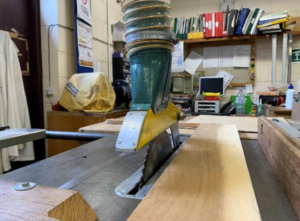£240,000 fine for company after fall left man paralysed
A Cheshire-based electrical transmission company has been fined £240,000 after a man was left paralysed from the chest down after a fall at work.
Gavin Pugh, from Bangor in North Wales, was 35 at the time of the incident and employed as a linesman by Wood Transmission and Distribution Limited. He had been demolishing and replacing electricity pylons in East Staffordshire when he fell more than 30 feet on 6 April 2022.
Birmingham Magistrates Court was told how Mr Pugh and his colleagues began working on a pylon known as Tower AE11 in preparation for its demolition. They were unaware there had been previous work to loosen the bolts on the tower, known as “bolt cracking”, undertaken by another team of linesmen. This work had not been risk assessed and there were no systems in place to effectively record and communicate what they had actually done.

In addition, the team that was sent to site that day was also under-staffed for the work being carried out. As the job progressed, Mr Pugh unknowingly attached his fall protection lanyard to a diagonal steel section that was only securely bolted in place at its uppermost fixing. As he moved around the tower, the steel section he was attached to dropped into a vertical position, causing his lanyard to fall loose, resulting in him falling to the ground. He spent six months in hospital and has been left unable to work as a result of his extensive injuries.
An investigation by the Health and Safety Executive (HSE) found that Wood Transmission and Distribution Limited failed to ensure that the work at height was properly planned, appropriately supervised, and carried out in a manner that was, so far as was reasonably practicable, safe. The company had not considered the work at height hierarchy as part of its planning and had not assessed the risks associated with bolt cracking. Furthermore, it had not adequately resourced the task in line with its own safety documentation, and had failed to put in place a process for transferring work between teams and ensuring safety critical information was recorded and communicated effectively.
On 12 April 2024, Wood Transmission and Distribution Limited, of Booths Park, Chelford Road in Knutsford pleaded guilty at Birmingham Magistrates Court to breaching regulation 4(1) of the Work at Height Regulation 2005. At a hearing on 17 July 2024 they were subsequently fined £240,000 and ordered to pay costs of £14,142.
HSE Inspector Robert Gidman said: “This tragic incident could have been prevented had Wood Transmission and Distribution Limited put in place adequate arrangements to protect its workers from harm.
“Proper assessment of the risks and consideration of work methods, adequate staffing, and clear procedures for transferring towers between teams could have enabled this work to go ahead without incident.
“Instead, because of the company’s shortcomings, a worker has sadly and unnecessarily been left paralysed.
“Companies should be aware that HSE will not hesitate to take appropriate enforcement action against those that fall below the required standards.”
Notes to editors:
- The Health and Safety Executive (HSE) is Britain’s national regulator for workplace health and safety. We are dedicated to protecting people and places, and helping everyone lead safer and healthier lives.
- More information about the legislation referred to in this case is available.
- Further details on the latest HSE news releases is available.
- HSE does not pass sentences, set guidelines or collect any fines imposed. Relevant sentencing guidelines must be followed unless the court is satisfied that it would be contrary to the interests of justice to do so. The sentencing guidelines for health and safety offences can be found here.



